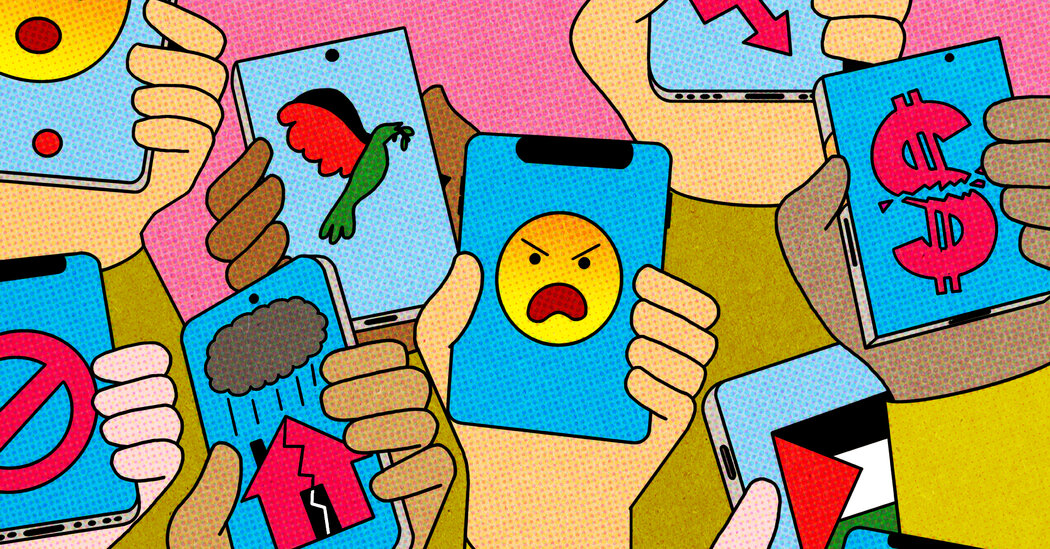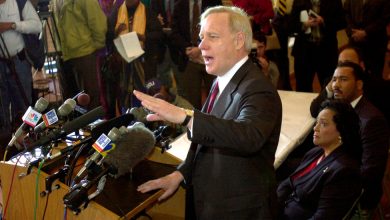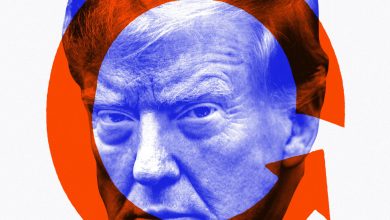
Avert Your Eyes, Avoid Responsibility and Just Blame TikTok
We’re in a season of hand-wringing and scapegoating over social media, especially TikTok, with many Americans and politicians missing that two things can be true at once: Social media can have an outsized and sometimes pernicious influence on society, and lawmakers can unfairly use it as an excuse to deflect legitimate criticisms.
Young people are overwhelmingly unhappy about U.S. policy on the war in Gaza? Must be because they get their “perspective on the world on TikTok” — at least according to Senator John Fetterman, a Democrat who holds a strong pro-Israel stance. This attitude is shared across the aisle. “It would not be surprising that the Chinese-owned TikTok is pushing pro-Hamas content,” Senator Marsha Blackburn said. Another Republican senator, Josh Hawley, called TikTok a “purveyor of virulent antisemitic lies.”
Consumers are unhappy with the economy? Surely, that’s TikTok again, with some experts arguing that dismal consumer sentiment is a mere “vibecession” — feelings fueled by negativity on social media rather than by the actual effects of inflation, housing costs and more. Some blame online phenomena such as the viral TikTok “Silent Depression” videos that compare the economy today to that of the 1930s — falsely asserting things were easier then.
It’s no secret that social media can spread misleading and even harmful content, given that its business model depends on increasing engagement, thus often amplifying inflammatory content (which is highly engaging!) with little to no guardrails for veracity. And, yes, TikTok, whose parent company is headquartered in Beijing and which is increasingly dominating global information flows, should generate additional concern. As far back as 2012, research published in Nature by Facebook scientists showed how companies can easily and stealthily alter real-life behavior, such as election turnout.
But that doesn’t make social media automatically and solely culpable for whenever people hold opinions inconvenient to those in power. While comparisons with the horrors of the Great Depression can fall far off the mark, young people do face huge economic challengesnow, and that’s their truth even if their grasp of what happened a century ago is off. Housing prices and mortgage rates are high and rents less affordable, resurgent inflation has outpaced wages until recently, groceries have become much more expensive and career paths are much less certain.
Similarly, given credible estimates of heavy casualties inflicted among Gazans — about 40 percent of whom are children — by Israel’s monthslong bombing campaign, maybe a more engaged younger population is justifiably critical of President Biden’s support of Benjamin Netanyahu’s government? Even the Israeli military’s own estimates say thousands civilians have been killed, and there is a lot of harrowing video out of Gaza showing entire families wiped out. At the same time, the Committee to Protect Journalists reports that at least 69 journalists and media workers have been among those killed in the war; Israel blocks access to foreign journalists outside of a few embedded ones under its control. (Egypt does as well.) In such moments, social media can act as a bypass around censorship and silence.
There’s no question that there’s antisemitic content and lies on TikTok, and on other platforms. I’ve seen many outrageous clips about Hamas’s actions on Oct. 7 that falsely and callously deny the horrific murders and atrocities. And I do wish we knew more about exactly what people were seeing on TikTok: Without meaningful transparency, it’s hard to know the scale and scope of such content on the platform.
But I’m quite skeptical that young people would be more upbeat about the economy and the war in Gaza if not for viral videos.
Why don’t we know more about TikTok’s true influence, or that of YouTube or Facebook? Because that requires the kind of independent research that’s both expensive and possible only with the cooperation of the platforms themselves, which hold so much key data we don’t see about the spread and impact of such content. It’s as if tobacco companies privately compiled the nation’s lung cancer rates or car companies hoarded the air quality statistics.
For example, there is a strong case that social media has been harmful to the well-being of teenagers, especially girls. The percentage of 12- to 17-year-old girls who had a major depressive episode had been flat until about 2011, when smartphones and social media became more common, and then more than doubled in the next decade. Pediatric mental health hospitalizations among girls are also sharply up since 2009. Global reading, math and science test scores, too, took a nosedive right around then.
The multiplicity of such findings is strongly suggestive. But is it a historic shift that would happen anyway even without smartphones and social media? Or is social media the key cause? Despite some valiant researchers trying to untangle this, the claim remains contested partly because we lack enough of the right kind of research with access to data.
And lack of more precise knowledge certainly impedes action. As things stand, big tech companies can object to calls for regulation by saying we don’t really know if social media is truly harmful in the ways claimed — a convenient shrug, since they helped ensure this outcome.
Meanwhile, politicians alternate between using the tools to their benefit or rushing to blame them, but without passing meaningful legislation.
Back in 2008 and 2012, Facebook and big data were credited with helping Barack Obama win his presidential races. After his 2012 re-election, I wrote an article calling for regulations requiring transparency and understanding and worried whether “these new methods are more effective in manipulating people.” I concluded with “you should be worried even if your candidate is — for the moment — better at these methods.” The Democrats, though, weren’t having any of that, then. The data director of Obama for America responded that concerns such as mine were “a bunch of malarkey.” No substantive regulations were passed.
The attitude changed after 2016, when it felt as if many people wanted to talk only about social media. But social media has never been some magic wand that operates in a vacuum; its power is amplified when it strikes a chord with people’s own experiences and existing ideologies. Donald Trump’s narrow victory may have been surprising, but it wasn’t solely because of social media hoodwinking people.
There were many existing political dynamics that social media played on and sometimes manipulated and exacerbated, including about race and immigration (which were openly talked about) and some others that had generated much grass-roots discontent but were long met with bipartisan incuriosity from the establishment, such as the fallout from the 2008 financial crisis, America’s role in the world (including the wars in Iraq and Afghanistan) and how international trade had reshaped the economy.
As we head into the 2024 elections, in some ways, little seems to have changed since Obama’s victory in 2008 — the first election dubbed the “Facebook Election.” We’re still discussing viral misinformation, fake news, election meddling, but there’s still no meaningful legislation that responds to the challenges brought about by the internet and social media and that seeks to bring transparency, oversight or accountability. Just add realistic A.I.-generated content, a new development, and the rise of TikTok, we’re good to go for 2024 — if Trump wins the Republican nomination as seems likely, only one candidate’s name needs updating from 2016.
Do we need proper oversight and regulation of social media? You bet. Do we need to find more effective ways of countering harmful lies and hate speech? Of course. But I can only conclude that despite the heated bipartisan rhetoric of blame, scapegoating social media is more convenient to politicians than turning their shared anger into sensible legislation.
Worrying about the influence of social media isn’t a mere moral panic or “kids these days” tsk-tsking. But until politicians and institutions dig into the influence of social media and try to figure out ways to regulate it, and also try addressing broader sources of discontent, blaming TikTok amounts to just noise.
The Times is committed to publishing a diversity of letters to the editor. We’d like to hear what you think about this or any of our articles. Here are some tips. And here’s our email: [email protected].
Follow the New York Times Opinion section on Facebook, Instagram, TikTok, X and Threads.




